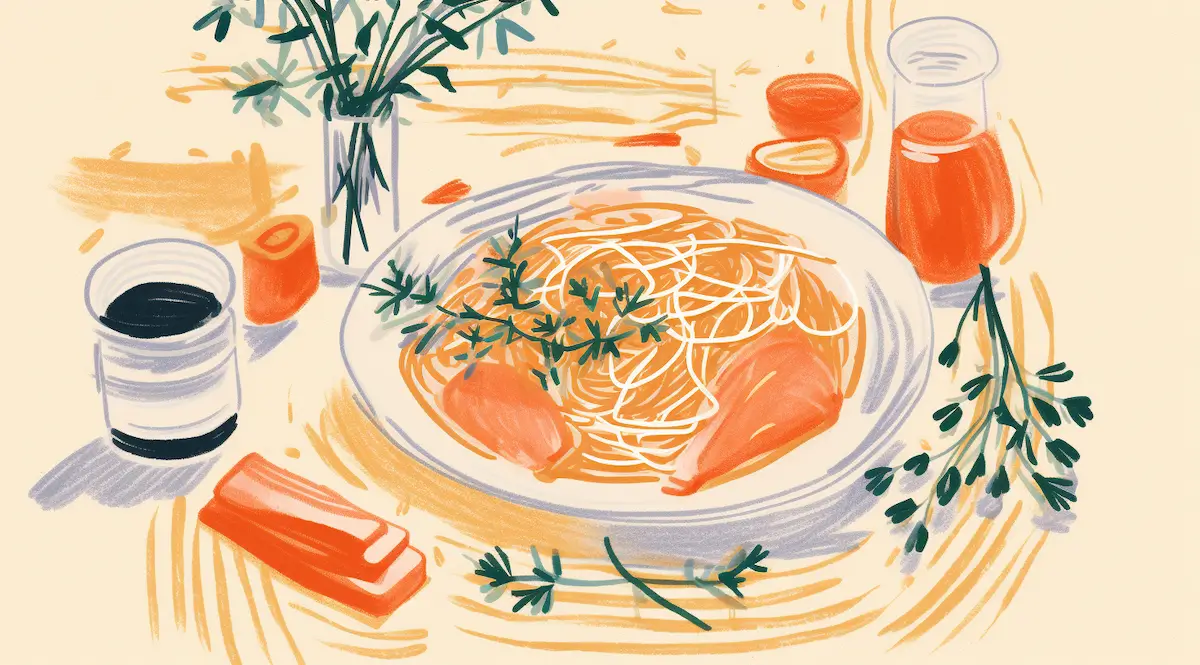It can be incredibly frustrating to feel hungry all the time, especially right after eating a full meal. If you’re living with diabetes, you may be wondering, does diabetes make you hungry? The answer is yes, and there’s a valid medical reason behind it. Diabetes can affect how your body uses glucose (the sugar in our blood), which may lead to a constant feeling of hunger known as polyphagia if your blood sugar levels are not managed. In this article, we’ll explain why this happens, what diabetes-related hunger feels like, and the steps you can take to better manage it.
Key Takeaways
Discover a healthier way
Covered by most insurance plans.

What Is Polyphagia in Diabetes?
If you’ve been feeling unusually hungry, even after you have just eaten, you might be experiencing polyphagia. This is a medical term that means excessive hunger or increased appetite. When it comes to diabetes, this happens when your body struggles to keep blood glucose within normal ranges (between 70 and 99 mg/dL). This can often be a sign that your body isn’t using glucose the way that it should.
In type 2 diabetes, polyphagia is commonly linked to insulin resistance. That means your body makes insulin (the hormone that helps move glucose into your cells), but your cells don’t respond to it properly. Because of this, excess glucose stays in your bloodstream instead of being used for energy, as it is intended to be. Therefore, your body thinks you’re still hungry, so it keeps signaling you to eat, even if you’ve just finished a meal.
In type 1 diabetes, the body doesn’t make enough insulin at all. With the body’s inability to produce insulin, glucose can’t get into the cells, and the same vicious cycle of persistent hunger begins. The end result in both cases is the same…your cells aren’t getting the fuel they need.
Why Does Diabetes Cause Extreme Hunger?
This ongoing hunger is your body’s response to a lack of energy at the cellular level. When glucose can’t enter your cells, they aren’t being “fed,” even though there’s excess glucose in your blood. This mismatch triggers the feeling of extreme hunger, because your body is trying to make up for the energy it’s missing.
This is known as insulin dysfunction, and it’s the main reason why diabetes can make you feel constantly hungry.
What Does Diabetes Hunger Feel Like?
Diabetes-related hunger can often feel very different from typical hunger levels. You might feel an urgent need to eat, even if you’ve had a full meal recently. These episodes often come with very strong hunger pangs, that feel like a gnawing, empty feeling in your stomach that doesn’t easily go away. It might feel like your body is telling you it’s running on empty, even though it’s not.
You might also notice hunger cravings that are especially strong for sugary or starchy foods. These cravings don’t have anything to do with taste. They are actually your body’s attempt to get quick energy when it thinks it’s low on fuel. But since the issue is all about how glucose is being used (not how much food you’ve eaten) the cravings can keep coming back.
Another common sign of this type of hunger is difficulty focusing. When your brain doesn’t get enough fuel, you may feel foggy, irritable, or extremely tired. Some people describe it as feeling “off” or not quite themselves until they have something to eat. This combination of physical and mental symptoms can be very frustrating and hard to ignore, especially if it happens often.
What Are the Early Warning Signs of Polyphagia?
Being able to recognize the early signs of polyphagia can help you take appropriate action before things become more serious. This kind of hunger usually doesn’t show up all on its own. It’s often a small part of a bigger picture related to your blood sugar.
One of the first warning signs is an excessive appetite that doesn’t match your usual eating habits. You might feel like you need to eat more often, or that no amount of food leaves you satisfied. This can happen even if your meals are well-balanced and filling. This is your body’s way of telling you that something isn’t working the way that it should.
Other early warning signs often come along with this ongoing hunger. These can include increased thirst (polydipsia), frequent urination (polyuria), and rapid weight changes of either gaining or losing weight without trying. These common symptoms could be your body’s response to blood glucose levels that are either too high or too low.
When Hunger Signals a Bigger Problem
If your hunger becomes constant, and you’re also feeling more tired, irritable, or dehydrated, it could be a sign that your body isn’t processing glucose properly. This is often because of insulin resistance, which means your cells aren’t responding well to insulin, and they’re not getting the energy they need. As a result, your body continues to send signals to eat, over and over again, leading to a cycle that can be frustrating and feel hard to break.
How Can You Manage Diabetes-Related Hunger?
If you’re dealing with constant hunger, you’re not alone. Trying to stop diabetes-related hunger can feel overwhelming, but there are some steps you can take to feel more in control. Managing this type of hunger starts with understanding what your body needs and by developing good habits that help encourage steady blood glucose levels.
One helpful technique is to eat regular meals throughout the day. Skipping meals or going too long in between eating can cause your blood sugar to either dip or spike, both of which can make your feelings of hunger worse. Smaller, more frequent meals can help keep your energy levels steady and reduce your hunger.
Good hydration also plays an important role. Try to drink plenty of water throughout the day. Dehydration can sometimes feel like hunger, and staying hydrated helps your body process glucose better.
What Should Someone With Diabetes Eat When They Feel Hungry?
If you feel like you’re always hungry with diabetes, choosing supportive and balanced foods can make a big difference in how you feel throughout your day. It’s not about eating less. Instead the focus should be on eating in a way that helps your body stay full and your blood sugar remain steady.
Using the balanced plate method is a great place to start. Aim to fill half your plate with non-starchy vegetables like spinach, peppers, or cucumbers. A bright green salad is the perfect choice. Next, add a quarter plate of lean protein like grilled chicken, tofu, white fish or beans. The last quarter of your plate should be filled with whole grains or high-fiber carbohydrates such as quinoa or lentils. These will help slow down the digestion process and will provide steady energy levels.
In between meals, you can eat foods that contain healthy fats and protein in order to keep you satisfied and energized. A handful of almonds, a spoonful of nut butter with apple slices, or some plain Greek yogurt with chia seeds can keep you feeling satisfied without causing a big blood sugar spike. These types of foods also reduce the urge to reach for less balanced options.
What Foods Do Diabetics Crave (and Why)?
As we mentioned, many people with diabetes experience strong food cravings for certain types of food, especially ones that are sweet, salty, or high in refined carbs. These cravings are often tied to blood sugar fluctuations and are a reflection of how your body responds with insulin sensitivity and resistance. When your cells aren’t getting the energy they need, your body sends out signals to eat quick sources of fuel.
Here are some of the most common cravings, and why they happen:
- French fries: High in starch and fried in fat, they are quickly digested and can cause your blood sugar to spike. They provide quick energy, but it isn’t lasting, which could lead to eating more in the long run.
- Potato chips: This snack is low in fiber and nutrients, but high in refined carbs and salt. Similarly to french fries, potato chips don’t provide lasting satiety, which can leave you hungry again sooner rather than later.
- Ice cream: Ice cream is packed with sugar and saturated fat. It causes a quick rise (and then drop) in blood sugar, leading to more cravings.
- White bread or pastries: These are made with refined flour, and they quickly break down into sugar. They can temporarily satisfy a surge of hunger but usually lead to a crash shortly afterward.
- Soda or sweetened drinks: These offer lots of sugar with little to no nutrients. They quickly increase your blood sugar but don’t provide any lasting energy or feelings of fullness.
Can Diabetes Medication Affect Your Hunger?
Yes, diabetes medication can play a role in how hungry you feel. Some medications help your body utilize glucose more efficiently, which can reduce hunger. Others may unintentionally increase your appetite as an unwanted side effect.
Medications That May Increase Hunger
Certain types of insulin or medications that increase insulin production can lead to an increase in appetite. This happens because they lower high blood sugar levels quickly, which may cause you to feel hungry soon after eating. If your blood sugar drops too low, your body may respond with strong signals to eat more, even if you’ve just had a meal.
Medications That Help Manage Hunger
On the other hand, some medications can help you maintain steady blood sugar levels, which helps reduce constant hunger. For example, GLP-1 receptor agonists (like semaglutide or liraglutide) work by slowing down digestion and helping you feel full for longer.
Metformin is another common medication that can improve the way that your body responds to insulin without causing a sharp drop in blood sugar.
When Hunger Isn’t Just Physical
Feeling hungry isn’t always about needing more food. Sometimes, emotional eating plays a role, especially when you’re dealing with the usual stress of daily life while managing diabetes. Stress, anxiety, and even boredom can lead to extreme cravings, usually for comfort foods that are sugary or high in refined carbs. These foods can provide short-term relief but will ultimately lead to blood sugar swings and even more hunger later on.
How Stress and Routine Affect Hunger
Changes in your routine (like skipping meals, not getting enough sleep, or feeling overwhelmed) can make you more likely to feel hungry, even if your body doesn’t actually need more food. These emotional signals can be just as powerful as the physical ones.
Paying attention to your hunger cues, building regular meal habits, and finding healthy ways to manage your stress (like walking, journaling, meditating, or having a talk with your doctor or dietitian) can help keep both your appetite and your emotions in better balance.
Lifestyle Changes That Help Curb Hunger
Making small, consistent lifestyle changes can go a long way toward helping you manage your diabetes-related hunger. Here are a few simple strategies that can help:
Exercise Regularly
Physical activity helps your body use glucose more efficiently and can reduce feelings of hunger over time. Even a short walk after a meal can improve how your body processes sugar.
Practice Mindfulness
Mindfulness techniques, like slow, intentional eating, breathing exercises, and yoga, can help you identify true hunger versus emotional or routine-based eating.
Prioritize Sleep
Poor sleep can interfere with the pituitary gland hormones that regulate hunger, leading to even stronger cravings and more frequent snacking. Making it your goal to achieve consistent, restful sleep each night can lead to better appetite control.
Plan Your Meals
Having a meal plan in place helps you stay ahead of your hunger and avoid any last-minute food decisions. Preparing balanced meals with fiber, protein, and healthy fats keeps blood sugar steady and hunger in check.
Are You Feeling Constantly Hungry? Talk to a Dietitian Today.
So, does diabetes make you hungry? Yes, it can in situations where blood sugar isn’t being properly managed. By meeting with a dietitian, you can find ways to manage your hunger and diabetes.
Diabetes-related hunger is often tied to how your body uses insulin and glucose, but fortunately, it can be managed. Through balanced meals, the right medications, and certain lifestyle changes, it’s possible to reduce constant hunger and feel more in control. Working with a registered dietitian can make a big difference. With Dietitian Live, you can work with a diabetes dietitian and take the guesswork out of your health management. We’re here to support you every step of the way with weekly check-ins and personalized nutrition advice to create a plan that works for you and keeps you feeling your best.
Frequently Asked Questions
What are 10 warning signs of diabetes?
Ten common warning signs of diabetes include excessive hunger, frequent urination, increased thirst, unexplained weight loss, blurred vision, slow-healing wounds, fatigue, tingling in the hands or feet, skin infections, and food cravings (especially for sweets or starches).
What are the 4 P’s of diabetes?
The “4 P’s” of diabetes are polyphagia (excessive hunger), polydipsia (increased thirst), polyuria (frequent urination), and paralysis (in rare, severe cases related to nerve damage or diabetic emergencies).
What are the stages of diabetes?
The stages of diabetes often include: insulin resistance or carbohydrate intolerance, prediabetes (with rising blood glucose levels), early diabetes with symptoms like fatigue and excessive hunger, and advanced diabetes with complications such as high blood sugar or nerve damage.
What are 5 signs of a diabetic emergency?
Signs of a diabetic emergency include low blood sugar levels, extreme confusion, rapid heartbeat, loss of consciousness, and seizures. These symptoms may occur when blood glucose levels drop too low or spike too high blood glucose levels, and immediate medical help is needed to restore balance and prevent harm.
What are the big three signs of diabetes?
The three most well-known signs of diabetes are polyphagia (excessive hunger), polydipsia (increased thirst), and polyuria (frequent urination). These appear when the body produces too little insulin or can’t use it properly.
Discover a healthier way
Covered by most insurance plans.






